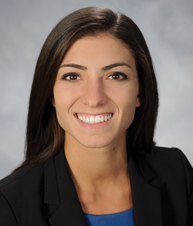Where Are They Now? An Interview with SLS Alum, Courtney Quiros (JD ’14)
For this installment of our “Where Are They Now?” alumni series, we spoke with SLS and Religious Liberty Clinic (RLC) alumna Courtney Quirós (JD ’14), whose experiences in both corporate and public interest law represent the wide variety of legal fields open to MLC students and alums. Courtney shares some of the factors that went into her clinic application process and a few significant moments during her time with the RLC.Â
Courtney Quirós is an associate at Alston & Bird LLP’s  Securities Litigation Group in Atlanta, GA. Her practice focuses primarily on securities fraud class actions, shareholder derivative suits, corporate investigations and other complex commercial litigation.

Q: Were you interested in your the field of religious liberty before you decided to take the clinic?
A: I was interested in religion and religious freedom before I decided to take the clinic. I studied Religion with a concentration on African American Christianity as an undergraduate at Princeton, and had become interested in the religious lives (and the regulation of the same) of men and women who are incarcerated.
Q: What did you know about clinical legal education before taking the clinic?
A: I had little formal knowledge about clinical legal education, but I knew I wanted to get out of the classroom and apply what I was learning. I think my biggest preconception was that we would be doing a lot of pushing paper around and rote applications. I was imagining a large client load and a sort of frenzied legal triage. I was surprised by how carefully Professor Sonne selected the clients and the thoughtful planning, strategizing, organizing, briefing, and collaborating involved in each of our cases.
Q: What went into your decision to choose to apply to do a clinic?
A: I knew from my first day at Stanford that I wanted to experience a clinic, so I  was planning to apply when the time came. As for choosing the Religious Liberty Clinic, I sat down with the materials from each clinic and asked myself what I could learn from each as well as what skills – if any – I could bring to the clinic team.  The Religious Liberty Clinic was only one semester old, so there were not a lot of students to report on the character of the clinic. I liked the idea of being in the second pioneer class, and I had some background in Religion, so it felt like a good fit.
Q: What are some of the salient moments of your clinical experience? What were your proudest, or most challenging, moments in the clinic? What was your most challenging moment in the clinic?Â
A: I could fill a book with significant moments from clinic. One of my proudest moments was sitting across from a client of ours in an under-the-sea-themed interview room in a prison facility in Southern Florida and hearing him express relief and gratitude that we took his religious liberty claim seriously and were going to fight on his behalf. He ultimately won the right to become circumcised in accordance with his faith while incarcerated, but the moment when we became his advocates strikes me as most significant.
The same characteristics that made our clients so amazing – their tenacity, their singular focus, their faithfulness – also at times made them difficult to work with. We had some grueling conversations about how to manage expectations and set realistic goals with these individuals. I’m a people-pleaser and a bulldog myself, so it was definitely a challenge for me to learn how to be not only a cheerleader for their issues, but a more thoughtful counselor. Also, as an aside, working with bureaucratic systems like prisons is always hard. Who knows how to use a fax machine? I didn’t, but now I do.
Q: What work products did you contribute to or finish during your time in the clinic?
A: We completed applications for zoning and religious accommodation, a complaint in federal court, briefs, and innumerable letters and emails.
Q: How and in what ways did your clinical training and experience help you prepare for your post-graduate position(s)?
Professor Sonne allowed us to drive our own schedules and self-manage, both of which have given me a leg up in my post-graduate position. I feel like I think more creatively about my cases and strategize more effectively having exercised those muscles in clinic.
A: Do you have advice for law students considering clinical legal education?
I would, without hesitation, recommend that law students who are on the fence go and talk to the directors of the clinics. Their passion for students and their vast knowledge and experience are compelling.
